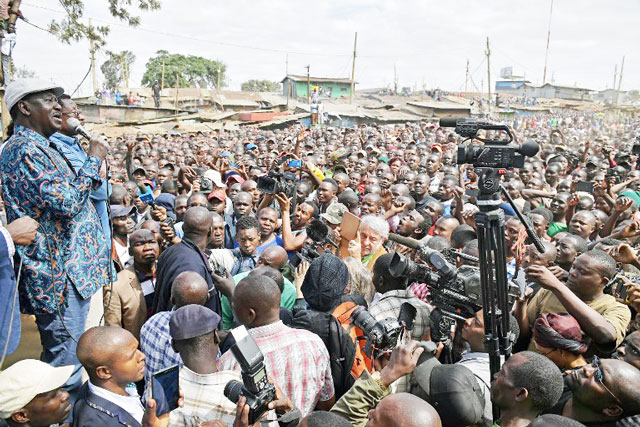
– Odinga’s options –
Should he back down and agree to go to the Supreme Court, he has until August 18 to do so.
He could also allow a third party to lodge a complaint about the election in his stead.
But the country’s NGO supervisory board has moved to shut down two high-profile organisations who are seen as likely to make such a move.
On Monday night the NGO board deregistered the Kenyan Human Rights Commission for alleged misappropriation and tax evasion.
And on Tuesday, it urged police to shut down Africog, which is often critical of the government, for “operating illegally”.
Odinga could also launch a protest campaign, which could lead to further violence and paralyse the economy.
Speaking Monday, Kenyatta said Odinga was welcome to protest legally.
“Just do it peacefully, orderly… As a government we will not allow loss of life, destruction of property and looting, because many, many millions of Kenyans also are desirous to go about their business as before,” he said.
– ‘Blatant’ police lies –
Police have denied innocent protesters have been killed, saying those shot dead were armed and had attacked officers, claiming many were carrying out criminal acts such as rape and looting.
The Red Cross puts the number of injured at 177.
However outrage has grown over police brutality and use of excessive force, with the Daily Nation the latest to weigh in, accusing the government of “blatant lies on riot deaths” in its editorial Tuesday.
“The government has badly handled the post-election unrest and created more confusion and public anger,” it said, urging police to “rein in officers hell bent on visiting mayhem on hapless citizens.”
Among the dead was a 9-year-old girl hit by a stray bullet when police opened fire in a slum, and local media said a six-month-old baby was in a coma after being clubbed during a police raid on a house during protests on Friday night.
The opposition claims the electronic voting system was hacked and the results manipulated, saying this may have been linked to the murder and torture of top election IT official Chris Msando a week before the poll.
Odinga’s National Super Alliance (NASA) has also said scanned forms meant to back up the results have not been provided to them.
The dispute has plunged Kenya into its worst political crisis since the 2007 post-election violence that laid bare decades-old political and ethnic grievances over access to power and land.
Three of Kenya’s four presidents — including Kenyatta and his father — have come from the Kikuyu ethnic group. The other was Kalenjin.
That has left the Luos, Odinga prominent among them, and other major ethnic groups feeling excluded from power and marginalised for over half a century.
ON SUNDAY
 The Independent Uganda: You get the Truth we Pay the Price
The Independent Uganda: You get the Truth we Pay the Price






we’re not happy as NASA supporters we feel Kenya should be split into two. Like Germany